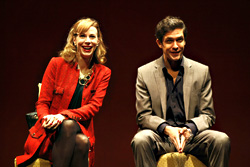It’s hard to get worked up over Hollywood’s lack of openly gay stars when we’re so transparently selective about whom we get worked up over: We indignantly whisper rumors about Travolta and Cruise, not about, say, Charles Durning or F. Murray Abraham, which suggests that our desire to open closets is roughly 10 percent a desire for honesty in the service of advancing tolerance and 90 percent wishful fantasizing.
It’s this sort of self-serving agenda that makes The Little Dog Laughed, Douglas Carter Beane’s stylized but inelegant comedy on the topic, kind of a slog. Mitchell Green (Neal Bledsoe) is an ambitious young actor on the verge of stardom and deep in denial. Drunk and alone one night in a Manhattan hotel room, he calls an escort service and up pops leather-jacketed Alex (Quinlan Corbett), an I-just-do-this-for-the-money-I’m-not-really-gay-no-seriously-I-have-a-girlfriend-I-fuck-women rent boy. They spend the night together, and improbably another and another.
Meanwhile, Alex’s club-kid kinda-girlfriend Ellen (Megan Hill) develops her own complication, and Mitchell’s agent/confidante Diane (Christa Scott-Reed) is negotiating the stage-to-screenplay conversion of a tender, sensitive gay drama by a tender, sensitive gay playwright (Beane’s unseen alter ego). She wants to straighten up the play’s romance and install Mitchell in the remaining guy part—which, baring her shark teeth, she informs the playwright that, according to the contract he signed, she has every right to do. (Apparently something just like this happened to Beane’s 1997 play As Bees in Honey Drown.) So Mitchell has to decide whether to openly pursue a relationship with Alex or accept this career-making role and keep Alex on the DL.
The whole closeted-screen-idol question makes a great premise for comedy (for a dazzling example, read Joe Keenan’s novel My Lucky Star, a masterpiece of plotting and dialogue), but as the central issue of what becomes a rather didactic problem play, no matter how quip-laden, it’s stale—a sourly self-righteous exposé of something everyone who pays the slightest attention to the industry already knows, an attempt at a satirical soufflé bogged down by Beane’s personal grievances. He seems to care considerably less about his characters than about taking revenge on the system that did him wrong—these four people (three of whom are not all that interesting) are just his props, which makes his crusade for truth seem more than a little disingenuous.
Beane undercuts his point (perhaps, to give him the benefit of the doubt, in an attempt to lighten up the sermonizing) in three ways. First, by making the courageous gay play that Diane so heartlessly violates sound insufferable. Second, by making Mitchell’s stakes so low: All he has to sacrifice is a week-old whatever-it-is between two rather self-absorbed guys who met when one hired the other for sex, and who are only now for the first time acknowledging their same-sex attraction. Seriously, how long could they expect their fling to last? Alex is a perfectly nice guy, but what actor wouldn’t trade such a naively tenuous possibility of romance for a juicy and visible part, especially one that might bump him from the B list to the A? Implicit in the moral dilemma Beane sets up is the suggestion that actors really shouldn’t be so devoted to their profession that they wouldn’t back-burner it for the next pair of tight jeans who walks by—something I can’t imagine him, or us, expecting of any other artist. (To Beane’s credit, he doesn’t force the tired point that hustlers and actors are both in the business of selling themselves, having Alex say something to the effect of “We’re all whores, honey.”)
Beane undercuts himself most of all by making Mitchell’s pushy closeter—a flamboyantly sharp, funny, and ruthless semi-villainess—by far the most charismatic character in the play. Diane is a ladder-clawer who wields her silken-tongued bitchiness like a sequin-encrusted shield—or tries to; she’s not so far along with her self-inflicted scruple-ectomy that she doesn’t still let her guard down. Scott-Reed skillfully balances campy ball-busting with likeability, vulnerability, and a touchingly needy affection for Mitchell (every fag needs a hag). She’s Kathy Griffin aiming for Cruella de Vil but landing closer to Renée Zellweger. It is, in fact, a full-on drag-queen part, and I kept flashing back to cabaret diva Lily Armani’s triumph last month in Charles Busch’s Vampire Lesbians of Sodom. What Intiman should have done is just go all the way and gender-fuck the whole show. (If I’d been in charge, we’d have Armani as Diane, Sarah Rudinoff as Mitchell, Andrew Tasakos as Ellen, and Bhama Roget as Alex.) It would have made Little Dog less “important” but a lot more fun.
==========
The Little Dog Laughed Intiman Theater, Seattle Center, 269-1900. $10–$48. See www.intiman.org for Tues.–Sun. schedule. Ends Sept. 13.







